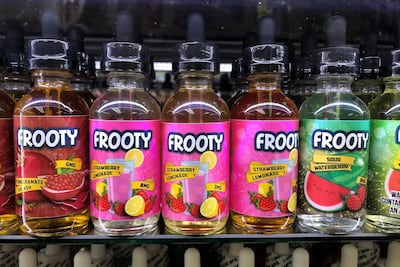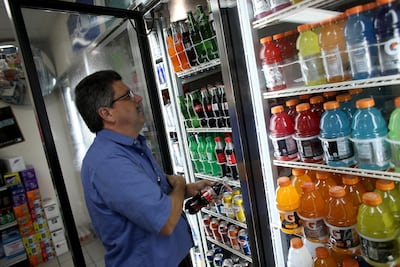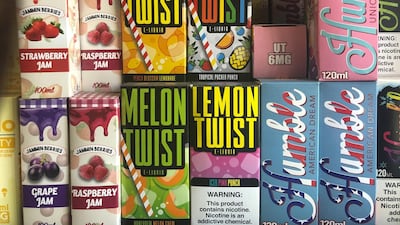As if trying to live more healthily wasn’t hard enough.
Diet sodas have now been found to increase the risk of heart disease, while doctors in the US are reporting a link between vaping and deadly lung disease.
Both health stories got huge coverage, and small wonder. Swapping sugar for artificial sweeteners has for decades been part of fat-busting diets, and vaping has become the go-to means of quitting smoking for tens of millions of people.
Yet at first glance, the evidence for the prosecution is pretty startling.
The health risk posed by diet sodas emerged from the largest-ever study of its kind, involving over 450,000 people who reported their consumption for an average of 16 years.
According to the findings, published by an international team earlier this month, drinking just two or more artificially sweetened drinks a day increased the risk of premature death by 26 per cent compared to those having less than one a month.
This was higher even than the risk posed by sugar-based drinks, which increased mortality rate by 17 per cent.
The principal threat appears to be from heart disease, the risk of which was increased by 41 per cent.
Published in the peer-reviewed journal JAMA Internal Medicine, the findings raise questions about health campaigns which persuade people to cut their sugar intake.
In the UAE, concerns about obesity levels has led the government to levy a 50 per cent tax on all sugary drinks, a strategy that has caused substantial declines in consumption.
But the new research hints at a potentially harmful unintended consequence if people are simply switching to diet drinks that are unhealthy in other ways.
It is a similar story with vaping. Over the last few weeks, reports have emerged of a mysterious and potentially fatal lung condition among e-cigarette users in the US. The symptoms typically start with shortness of breath, coughing and chest pain, along with nausea and vomiting.
X-rays almost always show signs of respiratory disease, with one teenage victim said to have lungs in a similar condition to a 70-year old.
Many are treated with antibiotics, but not always successfully. Out of more than 800 cases reported to date in 46 US states, 12 have died.
While the disease has been linked to vaping, its cause remains unknown. Last month, Robert Redfield, director of the US Centres for Disease Control in Atlanta, Georgia, activated the CDC’s Emergency Operations Centre “to protect our nation from this serious health threat”.
As with sugary drinks, the UAE has taken measures to encourage people to switch from tobacco to a synthetic alternative. The sale of e-cigarettes and vaping devices was made legal earlier this year.
But once again, the discovery of potentially lethal health effects has cast a shadow over the decision.
So what are we to make of these developments? First, we need to remember why diet sodas and e-cigarettes have proved so popular in the first place
According to the World Health Organisation, being overweight or worse kills around 3 million people each year. Even if the health risk from artificial sweeteners is as bad as is now being claimed, it is dwarfed by the doubling in heart disease and stroke risk faced by the seriously obese.
In the case of tobacco, the global death toll is around 8 million, with smoking tripling the risk of premature death.
These devastating statistics set the context for the recent spate of deaths among the millions of e-cigarette users in the US.
Every preventable death is a tragedy; even so, it makes no sense for e-cigarette users to react by switching back to tobacco. Even calls for a moratorium on vaping are questionable outside the US.

That’s because - astonishingly - the American e-cigarette market is still unregulated. As a result, extremely dubious vaping products are still available, including so-called THC which are often mixed with tocopheryl acetate, sometimes known as vitamin E oil.
Most of the cases currently under investigation by the CDC are thought to involve these substances, whose effects have long been a source of concern.
As such, it should come as no surprise that the mysterious vaping disease has emerged in the US.
In contrast, the vaping market in the UAE and Europe is tightly regulated, making it far harder to get access to dubious products.
Many health experts suspect the CDC investigation will find a link between the recent deaths and “street” vaping products. But even if that resolves the mystery, it is unlikely to end the controversy surrounding the industry.
Whether it is the addictive nature of nicotine or the “gateway” to tobacco smoking it allegedly provides to children, vaping still attracts criticism from major institutions in the US, including the American Medical Association.
Yet of all the professions, those practising medicine know there is rarely a risk-free solution to any ailment. Even the most effective treatments come with a litany of side-effects.

Take perhaps the closest thing medicine has to a panacea: aspirin. Best known for its pain-killing abilities and first exploited via willow-bark tea by Hippocrates over 2,000 years ago, low doses are now recognised as a means to cut lifetime risk of cancer, stroke and heart disease. It is routinely prescribed for millions of people, yet it also causes thousands of cases of potentially fatal bleeds into the brain and gut.
Even so, aspirin is still seen as a risk worth taking to fight conditions like heart disease, which kills 18 million people globally each year.
Public health issues often spark controversy, not least because they involve huge numbers of people. That allows even small risks to generate a host of anecdotal stories that capture our attention.
But in the case of artificial sweeteners and vaping, it’s crucial to keep in view the size of the threats they are pitted against. Annual deaths from obesity and tobacco smoking are equivalent to around 60 fully-laden jumbo jets crashing with no survivors every day.
If we are to make headway against that appalling toll, we need all the help we can get.
Robert Matthews is Visiting Professor of Science at Aston University, Birmingham, UK


